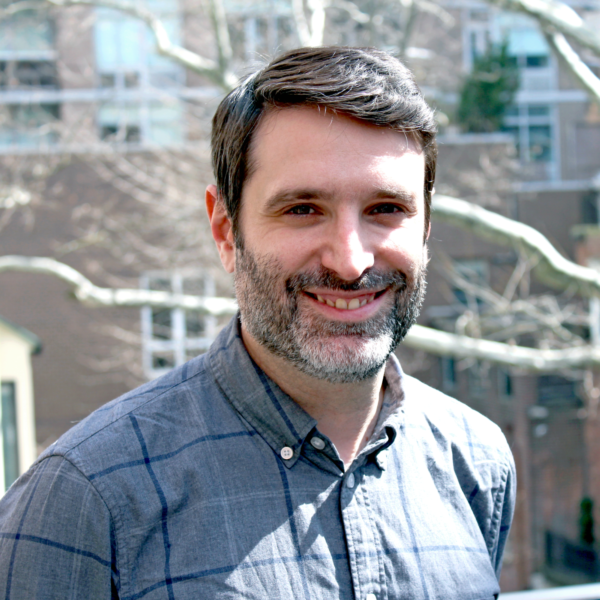The Middle East and North Africa is a particularly challenging region to create employment for young people and women, says Mariel Davis. Yet Education for Employment helps generate opportunities in unexpected and creative ways.
ALEX WOODSON: Welcome to the Carnegie New Leaders podcast. My name is Alex Woodson. Carnegie New Leaders is a membership program for young professionals who are working in a range of fields and wish to engage in a dialogue on ethics and international affairs. Through a series of formal and informal gatherings, CNL members interact with business professionals, policymakers, social innovators, and scholars who are changing the way we approach global ethics in the 21st century.
Today, our guest is Mariel Davis. Mariel is a communications and partnership manager at Education for Employment, also known as EFE. Thank you for coming today, Mariel.
MARIEL DAVIS: Thank you for having me, Alex.
ALEX WOODSON: Could you start out by telling a little about yourself, what your role is at EFE and what the organization does?
MARIEL DAVIS: I'm happy to. I manage the global communications and the portfolio of partnerships at Education for Employment. We are a network of non-profits working across the Middle East and North Africa on one of the region's defining issues: youth unemployment.
In order to create more economic opportunity for young people there—it is the region of the world with the highest rates of youth unemployment—we actually start at an unexpected place. Rather than starting with the young people themselves we actually start with businesses operating in the region, anywhere from Fortune 100 companies to small- and medium-sized enterprises. We work with them to understand how, through partnerships, we can create more job opportunities for entry-level workers, usually young people who are disadvantaged in their own communities.
My specific type of work at that organization is, again, working with these partners to understand what their skills needs are, how we can co-create curricula to give young people precisely the skills they need to succeed in entry-level positions. Then, we source and train young people and communities and we place them directly into jobs. My portfolio of partnerships is based primarily on global entities, so large companies that you've probably even heard of, like Accenture, Intel, Microsoft, companies that might have operations in the region and are looking to hire or expand there.
ALEX WOODSON: Let's start off with what you think the barriers are to youth unemployment in the region, in the Middle East and North Africa. What makes that region unique? I know some other regions have this problem as well, but what makes this especially unique for the Middle East and North Africa?
MARIEL DAVIS: Alex, that's a question I get asked a lot. As every listener to this podcast probably knows, youth employment is a challenge in almost every country. It's something Western Europe faces, something we face in the United States. But there are certain factors in the Middle East and North Africa that make it a particularly crucial challenge there.
The first one I would point to is demography. It's the region of the world with the fastest growing youth population, so when we talk about scale in terms of numbers in the coming years it's estimated that about 100 million jobs need to be created for young people just to keep the current levels of employment in place. To put that in perspective, we're talking about a region where one out of four young people is unemployed and that's a conservative estimate. There are a lot of communities where that number easily reaches above 50 and 60 percent unemployment among young people.
There are a couple of other complicating factors that make the Middle East and North Africa, or the MENA region, a particularly challenging region for youth employment. There are certain social and gender barriers that often make it difficult for young people to enter and break into the workplace. So I think something that a lot of people recognize is that there are gender barriers for women, not in all communities, but in many communities. Women might have certain expectations about the types of roles they want to hold in regards to family or children or marriage. There are also issues of significant discrimination in hiring women. It can be difficult for women to keep their place in the workplace, even after they have gained entry to it.
Also social discrimination is something that isn’t often talked about, but it is a very, very pervasive force making it harder for certain types of young people to enter the workplace. If you speak with anyone from the Arab world and use this word, I promise you you’ll get this knowing nod and the word is "wasta." It is Arabic for the sense of connections that are necessary to get your foot in the door. You can sort of describe it as nepotism but it is a very powerful force in the region. It is a well-accepted fact among most of the people who I've spoken with there that really in order to get into the workforce, you have to know someone. That has a number of implications, including from the business perspective of limiting the talent pool that they have access to.
Those are some of the factors. I haven't even gone into a lot of the obvious ones. We have conflict and instability. In some countries, there is very little for an investment. There are real challenges in the region when talking about youth employment.
ALEX WOODSON: Definitely. We'll get to the conversation about conflict soon. I wanted to touch on something else you talked about, which is the role of women in the work force.
I'm just curious—in the United States right now, in mid-May, 2015, it seems like we're having more of that conversation now than we have in the past. We're talking about equal pay for women compared to men, which is obviously a very important point. What kind of conversations are they having in the Arab world? Are they having conversations about getting women involved in the workforce? I know it's different in different countries, but what are the pundits talking about when it comes to that issue?
MARIEL DAVIS: Are they having those conversations? The answer is an emphatic " yes." Those conversations are happening, and they're happening in really different ways depending on where you are.
In countries like Tunisia, for instance, for decades you've had very, very engaged women in the workforce there and women in leadership positions there. That is one extreme end of the scale. On the other, you might have women from certain communities—Yemen and Jordan are two really good examples—where you'd typically find work environments less hospitable to women's entry.
Regionally, you'll find—I think OECD [Organisation for Economic Co-operation and Development] put together some statistics—about one in five women in the region is how they define as economically active, so it's participating in the formal economy.
As I mentioned, there are a number of different types of conversations going on around those issues. Actually something my organization, Education for Employment, has been interested in exploring are the expectations young women have for themselves about the types of jobs that they're looking to hold when they graduate from university, comparing those with the expectations that employers have about the accommodations that are important to women, and understanding where the gap is between those two perspectives is going to be a really important resource in helping young women transition successfully from school to the workplace.
But in terms of where the MENA region is right now, it's well-positioned to benefit from higher levels of women's economic participation. If you look at a country like Egypt, if they were to bring their women's economic engagement to a level comparable to that of men and employ women at the same level as men are currently employed, there are estimates that the GDP in that country would increase by 34 percent. That percentage increase in the UAE [United Arab Emirates], for example, is estimated to be about 12 percent. There are very significant economic gains to be made. Governments in the region realize this and they are looking for ways to make that transition happen.
ALEX WOODSON: Has this become more of a topic in the last 5 to 10 years—getting women involved in the workforce?
MARIEL DAVIS: I think so. I think that it also dovetails very nicely with the broader conversations and broader emphasis on youth employment in the region. This issue is now at the top of almost every national agenda—fixing the wide range of problems, discrepancies, distortions that are preventing young people from entering into the workforce. And along with that, there's a conversation about women.
ALEX WOODSON: Switching topics a little bit, you mentioned before about conflict and how that makes it very difficult to employ people or for people to find jobs. We had this Iraqi women's rights activist named Zainab Salbi come here a couple years ago. I just want to read you something she said that really stuck with me: "People in war still have to work. That's what everyone forgets. In Syria, right now, we're talking about war and war and war and this bombing and that bombing, but people in Syria still have to earn a living so they can eat. It's as simple as that. We have to address that very practical reality."
How do you do that exactly? Not necessarily the Syrian war, but countries like Yemen and Egypt have been in a state of conflict for years now. What does it actually look like when someone comes of age in Egypt or Yemen right now, and they want to get a job? There are bombs. There are shootings. It's a very different situation than going on Craigslist in New York or something like that. What do they do? What does your organization really do to help?
MARIEL DAVIS: First, I agree. I really love Zainab's quote because it reminds us of something that is so easy to forget, which is that beneath the headlines of conflict and violence, you just have people who are trying to live their lives. A job is a fundamental part of that. Economic opportunity, the ability to support your family with the type of stability and dignity that comes from a job—it’s still a desire that people have even if there are bombs falling around them.
What can we do in communities and situations of conflict? There are a couple of things. I would start by saying that we think creatively about it. In an example like Yemen, for instance, over the past few years, when levels of conflict have increased, one of the things that has kept an organization like Education for Employment going is the fact that, when we are operating in Yemen, we're not operating as a foreign American organization. Education for Employment is structured as a social franchise. You can kind of think about it as a series of McDonald's. They're locally owned. They're locally managed.
In Yemen, we are Yemen Education for Employment. Our full staff, they’re all Yemeni. Our board of directors there, they’re all Yemeni. They have their fingers on the pulse. They understand what's going on on the ground. They understand what regions are okay to hold job training and job placement programs and what areas are not so safe. They have first-hand, really direct, personal understandings of the types of situations that will be safe and stable enough to still be linking young people into economic opportunity.
One of the things that that results in is this creativity. If you don't have a lot of foreign investment in your economy and if some of your financial systems are frozen, what are the types of activities, what are the types of jobs that will be needed anyway? A lot of those go more into vocational trades. One of things that Education for Employment has done, I think, very successfully in the past couple of years in a country like Yemen and in an economy like Yemen is really identify what those trades are and steer young people into those.
Midwifery, great example. People in wartime continue to have children and they need to have their health care needs met. Nursing, emergency care, midwifery, things like mechanics, welding, those are tasks, those are jobs that are needed regardless of what the economic condition is in a certain country.
I would say that to complement that, something that's really important is tending not only to a young person's professional skill set but also to their emotional and psychological capabilities when it comes to dealing with conflict. You talk about normal workplace performance. It can be a struggle for any young person to get the type of focus that they need to perform well on the job. When you are an individual under duress in a wartime situation, your ability to focus and concentrate is really affected. We're not even talking about the logistics of getting to work on time.
Something that we found to be really, really important is offering that type of psychological support and networking that helps young people deal with the conflicting emotions, focus and find peace with themselves in the broader environment of conflict and instability. In Gaza, during and after the most recent round of instability and conflict there, we worked with a lot of our graduates just on meditation, helping them to focus and re-center themselves and also helping them to find that type of stability that they didn't get in their communities. Finding that through work can be a really beneficial process for a young person.
ALEX WOODSON: People that you've worked with there, they take to this idea of meditating? They understand the psychological work that needs to be done? Some people can be pretty resistant to it.
MARIEL DAVIS: Absolutely. As with any place in the world, there are a lot of people who would doubt or question the value of that type of approach. You would find that in the city that we're sitting in right now. You certainly find it in certain places in Gaza. I think that some of the most poignant feedback that we heard from that session expressed this very thought—"I walked in really doubtful. I didn't want to be there. I didn't understand what the point was. I walked out actually feeling a lot better about where I was in my life." I think that particularly when you have young people willing to own up to the fact that they were very skeptical and then also be open about how their feelings have changed, it's a pretty good sign.
ALEX WOODSON: That's great. Another thing that I wanted to talk about—I saw this on the EFE website and you mentioned this to me as well—is that entrepreneurship is something that you've been focusing on. So I was wondering if you could talk a little bit about that and the work that you're doing to encourage young people to be entrepreneurs and how that's helping the situation.
MARIEL DAVIS: Anyone involved in the fields of youth employment or doing regional work in the Middle East and North Africa more broadly certainly hears entrepreneurship discussed as a potential panacea to the youth employment challenges that exist in that region. I'll have to say that, on a personal level, I'm not convinced. There is a very important role that entrepreneurship plays, but it is not a panacea.
The way that Education for Employment sees entrepreneurship as fitting into the puzzle is that we see it as a complimentary pathway to economic opportunity for young people. The core thing that Education for Employment does is train young people and place them in jobs that already exist. There are some contexts where that's not realistic or that’s not optimal.
The context where that's not realistic is, at times, a context like in Yemen, where there are not enough formal job opportunities either available or coming online to meet the demand, or the job opportunities are there but not in the locations where young people are. What we have found helpful there is skilling up young people in the professional and start-up entrepreneurial skills they need to become self-employed.
This is sometimes referred to as the entrepreneurship of survival. It's the entrepreneurship where you're not taking a job that already exists in a formalized company because there's simply no option available to you. So, you go into self-employment. You might eventually grow your business to employ one or two or three other people, but you're typically going to be employed on your own for the long term.
Another type of entrepreneurship that is more opportunistic is when you're working within a context or an ecosystem where there is an entrepreneurship ecosystem. There is a favorable system of laws and regulations that make it relatively easy for you to found your business. There is reasonable access to finance and banking services for your business. There is also less of a stigma around failure. When we find those circumstances we are able to work with young people from disadvantaged backgrounds to help them take advantage of those circumstances.
One really interesting example of this that I would point to is that, for some populations of young people in Egypt, actually, e-commerce has created a very interesting opportunity for them to become entrepreneurs. What a lot of people don't realize is that there is massive growth in the e-commerce industry across the Arab world and specifically in Egypt because it has a very large potential user base. There simply aren't enough people who are able to bring existing businesses online and make them e-businesses.
You might have an artisan or someone producing products. They're able to sell to the people in their immediate geographic vicinity, but they could really grow their business if they had the expertise they needed to get their products online. Education for Employment has actually worked with the Arab world's leading e-commerce website—it’s called Souq.com—to train entrepreneurs, who are, themselves, consultants to local artisans and local businesses, to help them get their products online.
A particular opening like that can really help a young person from a disadvantaged background to take advantage of a market opportunity. I think that's a very good example.
More broadly speaking, when I mentioned at the start that I'm a little skeptical about the ability of entrepreneurship to provide a silver bullet to youth employment issues in the region, I think it's because we all have to acknowledge that entrepreneurship anywhere in the world has an extremely high failure rate. People often refer to the United States as being a very hospitable environment for entrepreneurs. I think the number that is most often bandied around is that one in ten people who are trying to start a business here, their business will be in existence and profitable five years after being founded.
No matter where you are in the world, it's really challenging. Particularly in the Middle East and North Africa, there is a very strong stigma against failure. It's not celebrated. It's not typically seen as a badge of honor as it might be in the United States. When you are working with young people from a background where they are disadvantaged, I think we need to be particularly thoughtful and particularly careful to make sure that we're going about entrepreneurship training in the right way.
ALEX WOODSON: Is there a larger trend or larger ideas that you think would have a better success rate than entrepreneurship that are being looked at?
MARIEL DAVIS: I think it's going to be a combination. One idea that I think shows a lot of promise is, for those entities with expertise in skilling up entrepreneurs and with working with entrepreneurs, focusing their efforts and resources on entrepreneurs who are in fields where they're likely to create larger numbers of jobs. I think that's a very interesting approach because you are steering resources towards fields that are most promising. You're also investing in the types of businesses that are more likely to create employment opportunities. If that’s the ultimate issue that you're trying to solve, creating more job opportunities, I think that's a very wise strategy.
ALEX WOODSON: Is that something like Souq.com? Working with entrepreneurs and artisans to build this website and build a new industry?
MARIEL DAVIS: I think it is a good example.
ALEX WOODSON: Are there other examples that you could talk about?
MARIEL DAVIS: Off the top of my head, I would say that there is a lot of interest and investment in, what we could broadly call, digital jobs and digital businesses. There are a lot of job opportunities to be had or created by businesses that are entering the digital job and social media space.
We're seeing a lot of job opportunities arise from helping businesses create their own websites. Front-end design and back-end design, that’s a very interesting area. A lot of job opportunities are going to be created in helping businesses manage social media and reach clients in untraditional ways. Those are two areas that I think are very promising for job growth.
ALEX WOODSON: That's really interesting. Just to wrap up a little bit, you talked about some stuff that is obviously troubling. You talked about conflict, women not in the workforce. I also hear some positive things. For example, the fact that there's this huge youth population, maybe that could be a good thing. Maybe we could end with some good news. What are some areas that the Middle East and North Africa have an advantage over other regions? What are some ways that this could be a positive story in a few years from now?
MARIEL DAVIS: Alex, I'm really glad you asked that question because if you sit down and read a newspaper and you’re in the United States, the only headline that you read on the Middle East and North Africa is probably a negative one. If you were to then have the opportunity to speak with a young person from that region, I think you'd probably hear them say, "Yes, we definitely have our challenges here. They're difficult and they're real, but there is so much more that this region represents than conflict." There's so much dynamism to be had when you have a growing and young population.
What things am I excited about? What's the good news story? The good news story is that the Middle East and North Africa has a very large youth population. Over the past several decades, governments in the region have made really significant strides in improving educational outcomes for those young people. Not only do you have a larger youth population but they're also more educated.
The question is are they better-educated? Are they educated in ways that will really help them to take advantage of the changes that globalization is going to bring in bringing the Middle East and North Africa closer to other world markets? I think with a certain amount of training, with demand-driven training, the answer is "absolutely yes."
This is a young population. They're dynamic. They're very creative. They're very willing to work hard. This is something that I'm just smiling as I say this because I'm remembering so many conversations I have with our graduates who say, "Listen, just give me a chance. I'm ready to work."
You also have a couple of other factors that position young people in the region really well to take advantage of some of the changes that globalization brings. First, I'd say that, for a lot of young people, they have a certain level of ability in global languages for commerce. You have a lot of individuals in North Africa able to speak French to a reasonably high degree, or they'll have capabilities in Spanish. In certain countries like Jordan and Egypt, you'll have reasonable levels of English ability.
That sort of primes the pump, certainly, for global businesses and international businesses to invest in those regions and grow their businesses there as those nations stabilize. A great example of this is IT [information technology] outsourcing and business process outsourcing. There's a lot of growth right now in North Africa for European firms looking to go into those areas. That's just one example.
Overall, I would say that the youth population is so often talked about in that region like it's a ticking time bomb. If you listen to those words and think about what they sound like to a 20-year-old who is living in the West Bank or is living in Cairo, that's a pretty damaging message to hear about yourself. I would love to hear a narrative shift coming out of the region and about the region that acknowledges the fact that a youth population does not have to be a liability. When a youth population has the right opportunities, they're a tremendous asset.
ALEX WOODSON: Great. Anything else you want to add? Anything that we missed?
MARIEL DAVIS: I think we covered it. Thank you so much for having me, Alex.
ALEX WOODSON: Thank for very much, Mariel.
This has been the Carnegie New Leaders podcast. My name is Alex Woodson. You can find us at carnegiecouncil.org, policyinnovations.org, or on iTunes. Thank you very much.





